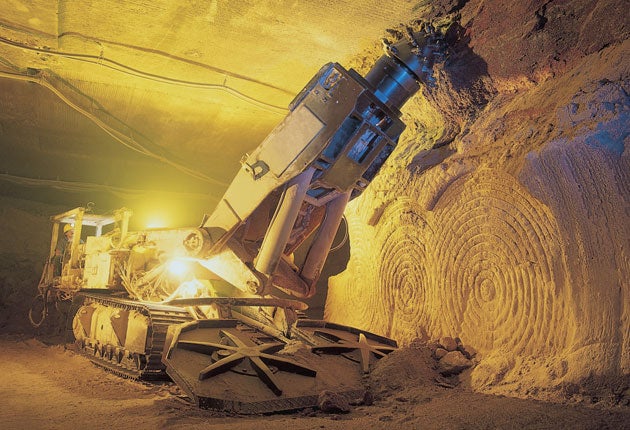Firm hopes promise of jobs will gather support for potash plans

Your support helps us to tell the story
From reproductive rights to climate change to Big Tech, The Independent is on the ground when the story is developing. Whether it's investigating the financials of Elon Musk's pro-Trump PAC or producing our latest documentary, 'The A Word', which shines a light on the American women fighting for reproductive rights, we know how important it is to parse out the facts from the messaging.
At such a critical moment in US history, we need reporters on the ground. Your donation allows us to keep sending journalists to speak to both sides of the story.
The Independent is trusted by Americans across the entire political spectrum. And unlike many other quality news outlets, we choose not to lock Americans out of our reporting and analysis with paywalls. We believe quality journalism should be available to everyone, paid for by those who can afford it.
Your support makes all the difference."There's potash in them thar hills" might lack the potency of the Klondike's rallying cry, but the discovery is causing passions to run high in the North York Moors.
Deep beneath the protected National Park landscape between the tourist towns of Whitby and Scarborough resides the world's largest deposit of agricultural fertilizer.
The estimated 1.3-billion-tonne treasure trove could help solve the globe's emerging food crisis. But getting it out of the ground is no easy matter. Laid down nearly a mile underground by the evaporation of a Permian-age sea stretching from England to Poland 250 million years ago, the polyhalite from which potash is processed is inconveniently situated in one of Britain's best-loved and fiercely guarded environments.
The international mining conglomerate Sirius Minerals is keen to exploit the reserves over the next 50 years and meet the burgeoning demand for the high-quality mineral currently fetching around $500 (£320) a tonne on world markets, but many locals are vehemently opposed.
Critics complain that the plans represent the greatest intrusion into a National Park since the creation of Sir Basil Spence's Trawsfynydd nuclear power station in the heart of Snowdonia half a century ago. To supporters, the scheme is an opportunity to help reverse the North East's long history of industrial decline, provide up to 4,000 local jobs and bring millions of pounds to an area struggling in the face of recession.
The local Sirius subsidiary York Potash is seeking to establish how it will remove the prize, which stretches east beyond the hills out under the North Sea. It has yet to submit a planning application for a fully operational mine, but Tom Chadwick, a retired art teacher and chairman of the North Yorkshire Moors Association, says opposition is swelling. "What is the point of having national park designation if you are going to do this? We are completely opposed to an industrial development on this scale," he says.
No one knows yet whether the planned mine will receive the consent of the five planning authorities who must agree to the proposal – due to be finalised later this year – without it being called in for a delaying and expensive public inquiry.
The company is also proposing to create a 41km pipeline taking the polyhalite to a new refinery it is planning on Teesside – an area desperate for jobs. "The economic argument is a very powerful one; we are fully aware of that," Mr Chadwick says. "But there has been a huge exaggeration in the number of jobs that might emerge from this and there is no guarantee those jobs will go to local people."
Gareth Edmunds of York Potash said there is considerable local support for the project and claims to have the backing of councils and the local MP and he hopes work can get underway next year.
Tom Chadwick, chairman of the North Yorkshire Moors Association, says opposition to the industrial development is swelling
Join our commenting forum
Join thought-provoking conversations, follow other Independent readers and see their replies
Comments